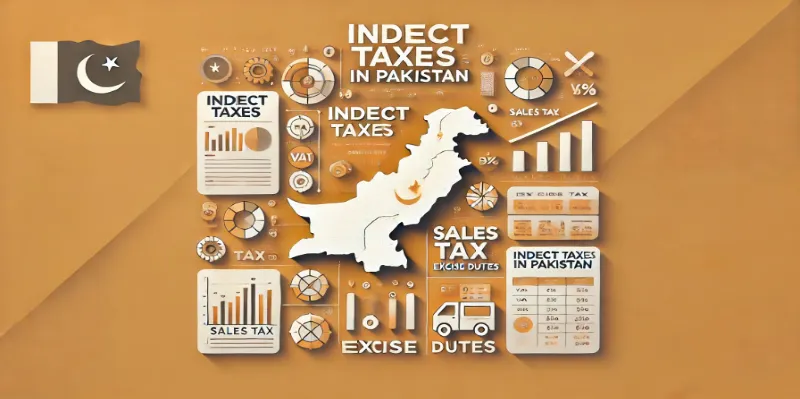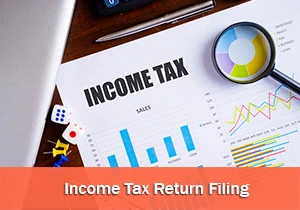
Indirect taxes are a vital part of Pakistan's fiscal policy, significantly impacting revenue generation and consumer behavior. These taxes, applied to goods and services, are collected from consumers by intermediaries such as retailers. This guide explores the types, advantages, and specific regulations of indirect taxes in Pakistan, including Sales Tax, Excise Tax, Customs Duty, and Gasoline Tax. By understanding these taxes, businesses and consumers can navigate the complex taxation landscape, ensuring compliance and contributing to the nation's economic growth. This comprehensive overview aims to provide clarity and actionable insights into Pakistan's indirect tax system.
Table Of Content
- What are Indirect Taxes?
- Types of Indirect Taxes in Pakistan
- Key Aspects of Indirect Taxation in Pakistan
- Advantages of Indirect Taxes
- Challenges in the Taxation System
- POS Integration and Real-time Reporting
- Historical Context of Taxation in Pakistan
- Reach Out For Expert Guidance!
What are Indirect Taxes?
Indirect taxes are taxes imposed on goods and services rather than on income or profits. Unlike direct taxes, which are paid directly to the government by individuals or organizations, indirect taxes are collected by intermediaries (such as retailers) from the end consumer. The most common examples of indirect taxes include Sales Tax, Value Added Tax (VAT), Excise Duty, and Customs Duty.
Types of Indirect Taxes in Pakistan
Pakistan's taxation framework includes several types of indirect taxes, each with its unique characteristics and implications for businesses and consumers.
1. Sales Tax
Sales tax is levied on the sale of goods and services and is collected by retailers from consumers at the point of sale. This tax is a significant source of revenue for the government.
In Pakistan, the sales tax rate on goods is 18%. The rates vary for services based on the province:
- Sindh: 19.5%
- Punjab: 16%
- Balochistan: 15%
- Khyber Pakhtunkhwa (KPK): 19.5%
- Islamabad Capital Territory: 16%
2. Excise Tax
Excise tax is imposed on specific goods, such as tobacco and alcohol. These goods are considered harmful to health, and the tax is levied at the manufacturing stage. The tax burden is ultimately passed on to consumers, making these products more expensive and potentially discouraging their consumption.
3. Customs Duty
Customs duty is charged on goods imported into Pakistan. This duty aims to protect domestic industries from foreign competition and generate revenue for the government. Imported items like electronics, automobiles, and luxury goods typically attract higher customs duties, making them more expensive for consumers.
4. Gasoline Tax
The gasoline tax is an indirect tax included in the price of fuel. This tax helps generate significant revenue for the government and encourages the conservation of fuel by making it more expensive. The tax is collected at the pump, directly affecting the price consumers pay for gasoline.
Key Aspects of Indirect Taxation in Pakistan
Indirect taxes play a crucial role in Pakistan's economy, providing the government with a steady revenue stream to fund public services and infrastructure projects. Understanding the principal indirect tax and compliance requirements is essential for businesses operating in the country.
Principal Indirect Tax
The principal indirect tax in Pakistan is the General Sales Tax (GST), governed by the Sales Tax Act of 1990. The Federal Board of Revenue (FBR) administers this tax, which applies to the supply of goods and services. The GST is a broad-based tax covering most goods and services, making it a significant contributor to the national revenue.
Registration and Compliance
To comply with GST regulations, businesses must adhere to specific registration and reporting requirements.
- Registration Limit: Businesses with an annual turnover exceeding PKR 3 million must register for GST. This threshold ensures that smaller businesses are not overburdened by tax compliance requirements.
- Non-established Businesses: Non-resident businesses providing electronically supplied or digital services to consumers in Pakistan must also register for GST. They are required to appoint a fiscal representative to comply with local tax laws, ensuring that all transactions are appropriately taxed.
- Filing Requirements: GST returns must be submitted monthly. Late submissions attract penalties, and businesses may face fines for other non-compliance issues. Overseas businesses not registered in Pakistan cannot claim VAT refunds, adding another layer of complexity for international companies.
GST Invoice Requirements
A valid GST invoice in Pakistan must include specific information to ensure transparency and compliance:
- Unique serial number
- Seller’s and buyer’s name and address
- Registration numbers of seller and buyer
- Date of issue
- Description and quantity of goods or services supplied
- Value exclusive of sales tax
- Amount of sales tax
- Total value inclusive of sales tax
Advantages of Indirect Taxes
Indirect taxes have several advantages, making them a vital part of the taxation system in Pakistan.
Inclusivity
Indirect taxes ensure that everyone, including the poor, contributes to state revenue. Unlike direct taxes, which often exempt lower-income individuals, indirect taxes apply to everyone who purchases taxed goods and services.
Ease of Collection
These taxes are collected at the point of sale, making the process straightforward and reducing the need for extensive paperwork. Retailers collect the tax and remit it to the government, simplifying the administration process.
Discouraging Harmful Consumption
High taxes on products like tobacco and alcohol can deter consumption, promoting public health. By making these products more expensive, the government can reduce their consumption and associated health risks.
Revenue Generation
Indirect taxes are a significant revenue source for the government, funding public services and infrastructure projects. The broad base of these taxes ensures a steady flow of revenue, supporting the country's development goals.
Challenges in the Taxation System
Despite the advantages, Pakistan's taxation system faces several challenges that need to be addressed.
Complexity
With over 70 unique taxes administered by at least 37 government agencies, the system is cumbersome. Businesses often struggle with compliance due to the complexity and overlapping jurisdictions of various tax authorities.
Low Compliance
As of 2021, only 2.5 million out of 7.1 million registered taxpayers were active filers. This low compliance rate limits the effectiveness of the tax system and reduces potential revenue.
Corruption
A 2002 study revealed widespread corruption, with many taxpayers paying bribes to lower their assessments. Addressing corruption is crucial for improving the efficiency and fairness of the tax system.
POS Integration and Real-time Reporting
To enhance transparency and compliance, the FBR has introduced a real-time sales reporting system. This system requires tier-1 retailers to integrate their Point of Sale (POS) systems with the FBR’s invoicing system. The integration ensures accurate reporting of sales and timely payment of taxes.
Implementation and Incentives
According to new Tax Laws (SRO-1006), all tier-1 retailers are required to integrate their POSs with FBR’s real-time invoicing system. This integration aims to streamline tax collection and reduce evasion.
Challenges and Solutions
Many medium- and small-sized tier-1 retailers have yet to integrate their POS systems. To facilitate this process, specialized POS integration software has been developed, ensuring data security and compliance with FBR requirements.
Historical Context of Taxation in Pakistan
Understanding the history of taxation in Pakistan provides context for the current system and its challenges.
Income Tax Act of 1922
The Income Tax Act of 1922, inherited from the British Raj, initially formed the basis of Pakistan's tax code. This act was the foundation of modern tax laws in the country.
Income Tax Ordinance, 1979
The first law specific to Income Tax in Pakistan was the Income Tax Ordinance of 1979. This ordinance marked a significant step towards formalizing tax collection and compliance.
Income Tax Ordinance, 2001
To modernize and align with international standards, the Income Tax Ordinance of 2001 was enacted, effective from July 1, 2002. This ordinance brought significant changes, simplifying tax laws and making them more transparent.
Reach Out For Expert Guidance!
Understanding indirect taxes is crucial for businesses and consumers alike. These taxes not only contribute significantly to government revenue but also play a role in shaping economic behavior. By staying informed and compliant with local tax laws, businesses can avoid penalties and contribute to the nation's economic development.
Contact our professionals for tax consultancy services today and get expert guidance on the complexities of indirect taxes. Let us help you optimize your tax strategy and ensure compliance with the latest regulations.
Reach out to us now and contribute to an equitable tax system!


